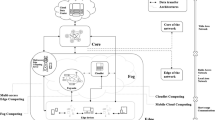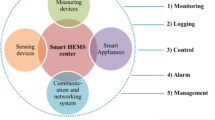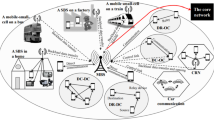Abstract
Mobile grid, which combines grid and mobile computing, supports mobile users and resources in a seamless and transparent way. However, mobility, QoS support, energy management, and service provisioning pose challenges to mobile grid. The paper presents a tradeoff policy between energy consumption and QoS in the mobile grid environment. Utility function is used to specify each QoS dimension; we formulate the problem of energy and QoS tradeoff by utility optimization. The work is different from the classical energy aware scheduling, which usually takes the consumed energy as the constraints; our utility model regards consumed energy as one of the components of measure of the utility values, which indicates the tradeoff of application satisfaction and consumed energy. It is a more accurate utility model for abstracting the energy characteristics and QoS requirement for mobile users and resources in mobile grid. The paper also proposes a distributed energy–QoS tradeoff algorithm. The performance evaluation of our energy–QoS tradeoff algorithm is evaluated and compared with other energy and deadline constrained scheduling algorithm.
Similar content being viewed by others
References
Borges VCM, Dias JS, Rossetto AGM, Dantas MAR (2007) SuMMIT an architecture for mobile devices to coordinate the execution of applications. In: WETICE 2007: 16th IEEE international workshops on grid environments enabling technologies: infrastructure for collaborative enterprises, 18–20 June 2007, pp 217–222
Zong Z, Qin X (2007) Energy-efficient scheduling for parallel applications running on heterogeneous clusters. In: International conference on parallel processing (ICPP 2007). IEEE, New York
Huang Y, Mohapatra S, Venkatasubramanian N (2005) An energy-efficient middleware for supporting multimedia services in mobile grid environments. In: IEEE international conference on information technology
Park E, Shin H, Kim SJ (2007) Selective grid access for energy-aware mobile computing. In: Indulska J et al (eds) Proceedings of UIC 2007. LNCS, vol 4611. Springer, Berlin, pp 798–807
Hummel KA, Jelleschitz G (2007) A robust decentralized job scheduling approach for mobile peers in ad-hoc grids. In: CCGRID 2007: Seventh IEEE international symposium on cluster computing and the grid. May 2007, pp 461–470
Wong S-W, Ng K-W (2008) Performance evaluation of mobile grid services. In: Nguyen NT et al (eds) KES-AMSTA 2008. LNAI, vol 4953. Springer, Berlin, pp 557–566
AlEnawy TA, Aydin H (2005) Energy-constrained scheduling for weakly-hard real-time systems. In: Proceedings of the 26th IEEE international real-time systems symposium (RTSS’05). IEEE, New York
Xie T, Qin X, Nijim M (2006) Solving energy-latency dilemma: task allocation for parallel applications in heterogeneous embedded systems. In: Proceedings of the 2006 international conference on parallel processing (ICPP’06). IEEE, New York
Kim KH, Buyya R, Kim J (2007) Power aware scheduling of bag-of-tasks applications with deadline constraints on DVS-enabled clusters. In: Proceedings of the seventh IEEE international symposium on cluster computing and the grid. IEEE Computer Society, Washington, pp 541–548
Katsaros K, Polyzos GC (2007) Optimizing operation of a hierarchical campus-wide mobile grid for intermittent wireless connectivity. In: IEEE LAN/MAN workshop (LANMAN 2007)
Li C, Li L (2007) Utility based QoS optimisation strategy for multi-criteria scheduling on the grid. J Parallel Distributed Comput 67(2):142–153
Li C, Li L (2007) Joint QoS optimization for layered computational grid. Inf Sci 177(15):3038–3059
Li L, Li L (2004) Agent framework to support computational grid. J Syst Softw 70(1–2):177–187
Li L, Li L (2006) Multi-economic agent interaction for optimizing the aggregate utility of grid users in computational grid. Appl Intell 25(2):147–158
Li C, Li L (2005) A distributed utility-based two level market solution for optimal resource scheduling in computational grid. Parallel Comput 31(3–4):332–351
Luh PB, Hoitomt DJ (1993) Scheduling of manufacturing systems using the Lagrangian relaxation technique. IEEE Trans Autom Control 38(7):1066–1079
Kelly F, Maulloo A, Tan D (1998) Rate control for communication networks: shadow prices, proportional fairness and stability. J Oper Res Soc 49(3):237–252
Bertsekas D (1999) Nonlinear Programming, 2nd edn. Athena Scientific
JAVASIM, http://javasim.ncl.ac.uk
BRITE, http://www.cs.bu.edu/brite
Swaminathan V, Chakrabarty K (2001) Real-time task scheduling for energy-aware embedded systems. J Franklin Inst 338:729–750
EGEE, http://www.eu-egee.org/
Author information
Authors and Affiliations
Corresponding author
Rights and permissions
About this article
Cite this article
Li, C., Li, L. Tradeoffs between energy consumption and QoS in mobile grid. J Supercomput 55, 367–399 (2011). https://doi.org/10.1007/s11227-009-0330-5
Published:
Issue Date:
DOI: https://doi.org/10.1007/s11227-009-0330-5




